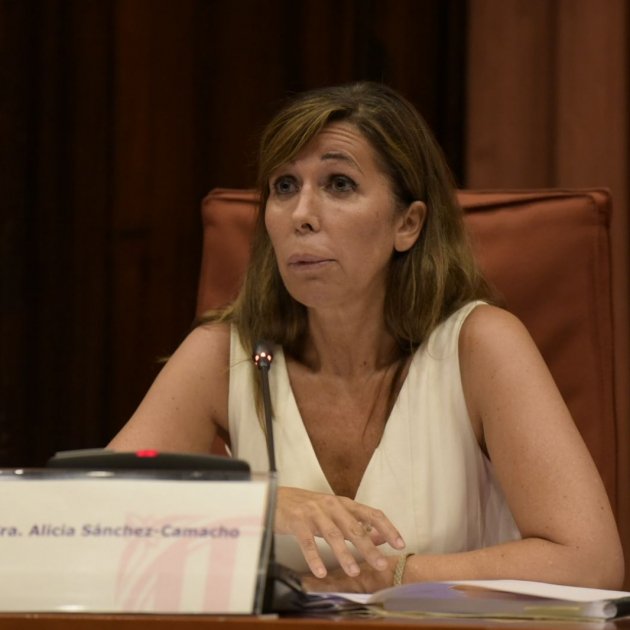Catalan president in exile Carles Puigdemont has lashed out at the former leader of the People's Party (PP) in Catalonia, Alícia Sánchez-Camacho, accusing her of being "a despicable person who conspired with a corrupt police plot for political reasons", after the emergence this Friday of audio recordings of a conversation between ex-police commissioner and "dirty ops" leader José Manuel Villarejo and Sánchez-Camacho, whose subject matter relates to Operation Catalonia. Sánchez-Camacho is a key element in this plot. Catalan digital newspaper El Món has published recorded conversations in which the former PP leader allegedly provides a blacklist of Catalan pro-independence leaders for Villarejo to investigate. To be precise, Sánchez-Camacho appears to recommends the illicit investigation of: businessperson Carles Sumarroca; politician Enric Lacalle, accused of "being a double agent"; then- Catalan president Artur Mas; his political ally Josep Antoni Duran, head of the Unió party; politician Oriol Pujol, son of former president Jordi Pujol: then-director of La Caixa foundation, and now Catalan economy minister, Jaume Giró; and then-editor of La Vanguardia, José Antich. In addition, the newspaper claims that it was Camacho who gave president Mas's telephone number to the commissioner. Puigdemont, through a tweet, portrays Sánchez-Camacho as a "despicable person" who "meets with the patriotic police brigade and passes them blacklists of people who, if we were in the 1930s, would have been executed. A mafia conspiracy that will go unpunished."
Sánchez-Camacho's blacklist
This conversation, to which El Món has had access, took place at a meeting on November 6th, 2012 at Sánchez-Camacho's home. In the recording, Camacho makes it clear that Jaume Giró must be investigated because, according to him, "he has gone completely pro-independence, despite earning between 400,000 and 500,000 euros a year". Camacho passes on Jaume Giró's phone number to Villarejo and also that of the then-Catalan president Artur Mas, because she tells him that he has accounts in Luxembourg and Andorra, and that he does the dirty work for Jordi Pujol. In fact, they were working with a clear goal: preventing Convergència i Unió - now defunct, but then the leading Catalan nationalist political grouping - from achieving an absolute majority at the elections due on November 25th: "This war we will fight is to prevent these guys from obtaining an absolute majority, but on the 26th we have to keep working as hard as we can," said the former police commissioner. And Camacho adds: "Mr Mas will have a majority here, and will push through Parliament unilateral declarations of independence, and the whole works."
In this conversation, Camacho explains to Villarejo that Giró always tells her that he would like to go to events attended by then Spanish prime minister, Mariano Rajoy, when he comes to Barcelona. In this regard, Villarejo classifies Giró as part of a plot being carried out by Joan Maria Nin, one of La Caixa's top executives at the time, and involving Isidre Fainé, chairman of the La Caixa board. The former police commissioner sketches out a war between the two, adding that Faine has a chance to win and "wants to cut Nin's neck off." For Camacho, the case of Giró is especially important, even at the end of the conversation when telephone numbers are exchanged, she insists: "remember Giró".
Once they have resolved this issue, they turn their attention to another objective. "It's important to focus on the Pujols, especially Oriol." About Oriol Pujol, it is said that he does business with a "guy from Galicia on the purchase of expired medicines." Another of those who are in their sights, and whom both consider necessary to attack, is Josep Antoni Duran i Lleida, who was the leader of Unió at the time, allied with Artur Más's party Convergència. Villarejo says he has money in Andorra and describes him as a double agent, playing both sides. That's why they think they should take him out of the political arena any way they can. Villarejo says he is "a key guy who needs to be dismantled" and Sánchez-Camacho adds that he should be "sent into exile." Camacho also describes Enric Lacalle, a former PP city councillor in Barcelona, as a double agent. She accuses him of working for Convergència i Unió and also of having a good relationship with the PP's Jorge Fernández Díaz, and of helping Artur Mas to commit to an independence pathway.
